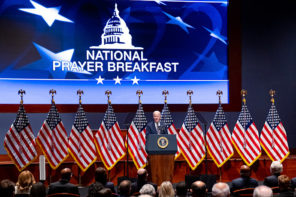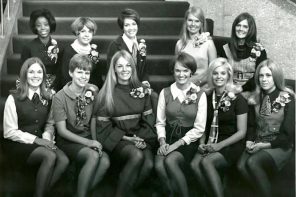The Senate Judiciary Committee begins its confirmation hearings for Elena Kagan today, and secular groups are raising concerns about her commitment to church-state separation.
The Secular Coalition for America is opposing Kagan’s nomination, the group said in a statement released last week, “until she makes her support for church-state separation much more clear and emphatic.” The group cites five specific instances that it says “raise grave concern that Ms. Kagan does not share the judicial philosophy of Justice Stevens.”
Americans United for the Separation of Church and State did not oppose Kagan’s nomination, but sent a letter to the Judiciary Committee urging it to question Kagan on most of the same issues raised by the SCA, calling it “imperative” that the panel question Kagan on positions on religious liberty issues, noting issues in her record “raise concern.”
Among the concerns raised by both groups:
As a Clinton administration attorney, Kagan described as “quite outrageous” a Supreme Court ruling that a landlord could not discriminate against an unmarried couple because her religion condemned sex out of wedlock;
Also during her stint in the Clinton White House, Kagan was, according to her own description, the “biggest fan” of the Religious Freedom Restoration Act, under which, if it had passed, “applicants for employment or housing may have had no legal protection from being forced to answer religiously motivated questions concerning their marital status, sexual orientation, religious beliefs, or whether they are pregnant or HIV-positive,” according to the SCA. Americans United notes that Kagan urged then-Vice President Al Gore’s staff not to mention the bill “because this law and a follow-on bill in Congress had sparked conflict between religious liberty advocates and the LGBT community;”
During her confirmation hearings to become Solicitor General, Kagan described a memo she wrote as a clerk for Supreme Court Justice Thurgood Marshall as “deeply mistaken” and “utterly wrong,” and “the dumbest thing [she] had ever read.” In the memo, Kagan wrote that religious groups should not receive funding even for secular activities because the money would inevitably be used for sectarian purposes;
When Charitable Choice, a precursor to current federal faith-based initiatives, were including in the 1996 welfare reform legislation, Kagan downplayed the Justice Department’s insistence that recipients of federal aid should not be “pervasively sectarian,” and, according to Americans United, appeared satisfied when the Justice Department provision did not make it into the bill.
The Judiciary Committee typically doesn’t probing questions on church-state separation issues, as they (like Kagan in her advice to Gore’s staff) think of these issues as too hot to handle politically. The Democrats, obviously, are the ones who have to take the lead on that — and they’re going to be loathe to embarrass the president’s nominee.
Meanwhile, the Republicans are calling well-known opponents of church-state separation, like Lt. Gen. William “Jerry” Boykin, US Army (ret.), who describes the U.S. military as an “army of God,” and the Family Research Council’s Tony Perkins, who fears Kagan is part of an Obama administration plan to “homosexualize” the military. The FRC recently issued a prayer alert in opposition to Kagan: “May God stir the U.S. Senate to confirm only judges and justices who fear God, who will interpret the Constitution as intended by the Founders, and who will not legislate from the bench or use the Courts to impose their social philosophy upon Americans.”




